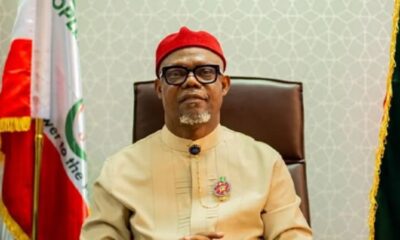Business
Tax: FG Moves To Track Remote Workers’ Income

Chairman of the Presidential Committee on Fiscal Policy and Tax Reforms, Taiwo Oyedele, has disclosed that Nigeria has entered into agreements with over 100 countries to collect data on remote workers as part of efforts to ensure tax compliance.
Speaking during a webinar organized by the National Orientation Agency on Wednesday, themed “Simplifying Nigeria’s Tax System,” Oyedele addressed concerns about taxation in the digital economy, especially for remote and online income earners.
He emphasized that every remote worker in Nigeria must declare their income, regardless of where the company or client is based.
“For the other categories of people who work online, the kind of people you spoke about, where companies just outsource something to them… you might have five stars, another person has 50. The requirement under this new law is that everybody, whether you earn your money from Google or whether you earn it from XYZ Limited in the Bahamas, you have to declare your income yourself. If you fail to do it, the system will then gather intelligence, which is when the money hits your bank account,” he said.
Oyedele explained that the government has access to transaction records and has signed agreements with more than 100 countries to track Nigerians with assets and funds abroad.
“We see this money coming to your Dollar Bank account. If you put the money abroad, Nigeria has signed an agreement with over 100 countries under what is called the Common Reporting Standards. They are already sending us data about Nigerians who have money abroad, property abroad, whether it’s Dubai to the US to Canada to the UK. We have all that information already,” he said.
He urged Nigerians to “do the right thing,” warning that the government would take action against those who fail to comply.
“Essentially, my point is, if it’s about data, the government can get the data. The primary obligation is to do the right thing yourself. If you fail to do it, the government will then come back to you and say, ‘We know this about you, you haven’t been honest, here’s your presumptive assessment.’ And at that point, you have to deal with it.”
Oyedele recalled that Nigeria began engaging big tech companies three to four years ago to address the unfair advantage online businesses had over traditional ones regarding Value Added Tax (VAT).
“If you are doing your business, brick and mortar, pop and mom shop, and you sell a phone and you charge VAT, why should the person that is selling it online not charge VAT?” he asked. “We went to these guys and said the services you render are liable to VAT. You are getting an undue advantage by doing it from abroad.”
He stated that rather than confrontation, the government adopted a collaborative approach, which resulted in mutual agreements.
“We spoke to them, what are your concerns, how can we make it work, and we landed on an agreement. Today I can tell you Nigeria is making billions of dollars from those taxes, from those digital giants without fighting.”
Oyedele acknowledged that the newly signed tax legislation contained inconsistencies, particularly regarding turnover thresholds.
“Section 147 of the Nigerian Tax Administration Act says N100 million. Section 202 of the Nigerian Tax Act says N50 million for turnover,” he said. “The answer to your question is yes, it was an error.”
He attributed the mix-up to errors made during the gazetting process after President Bola Tinubu signed the bills into law on June 26, 2025.
“The Department of Government that is supposed to do the gazetting… said they’ve never done anything like that before,” Oyedele explained. “In the process of editing, typesetting, the 50 that was there originally went into one of the laws.”
Despite spending months trying to fix the gazette, Oyedele said the committee decided to continue with implementation while preparing amendments for 2026.
“The minimum threshold for exemption is 100 million. That’s what you’ll find when the regulations are out,” he confirmed. “Let’s move forward so our good becomes better than wait until it is best.”
Oyedele also clarified that Nigeria’s new Capital Gains Tax (CGT) framework will not tax investment gains made before 2026.
According to the committee, the new Nigeria Tax Act 2025 will take effect from January 1, 2026, introducing a cost basis reset and grandfathering clause to ensure that only new profits earned after the reform are taxed.
Source: Nairametrics
-

 Celebrity Gist23 hours ago
Celebrity Gist23 hours agoI love Nicki Minaj – Donald Trump
-

 World News23 hours ago
World News23 hours agoKing Charles Breaks Silence After Arrest Of Brother, Prince Andrew, Over Misconduct Allegations
-

 News23 hours ago
News23 hours agoJUST IN: Rivers senator, Barinada Mpigi, dies at 64
-

 News8 hours ago
News8 hours agoGunmen Attack Kebbi Communities, Kill 35
-

 Metro23 hours ago
Metro23 hours agoNigerian bags 8-year jail term over $1.3m cyber fraud in US
-

 News21 hours ago
News21 hours agoNigeria’s W’Bank IDA debt hits $18.7bn
-

 Sports23 hours ago
Sports23 hours agoEPL: Arteta Urges Arsenal To Channel ‘Pain’ From Wolves Draw Into Tottenham Clash
-

 News22 hours ago
News22 hours agoJUST IN: Many feared dead as terrorists storm homes, shoot indiscriminately in Kebbi communities


















